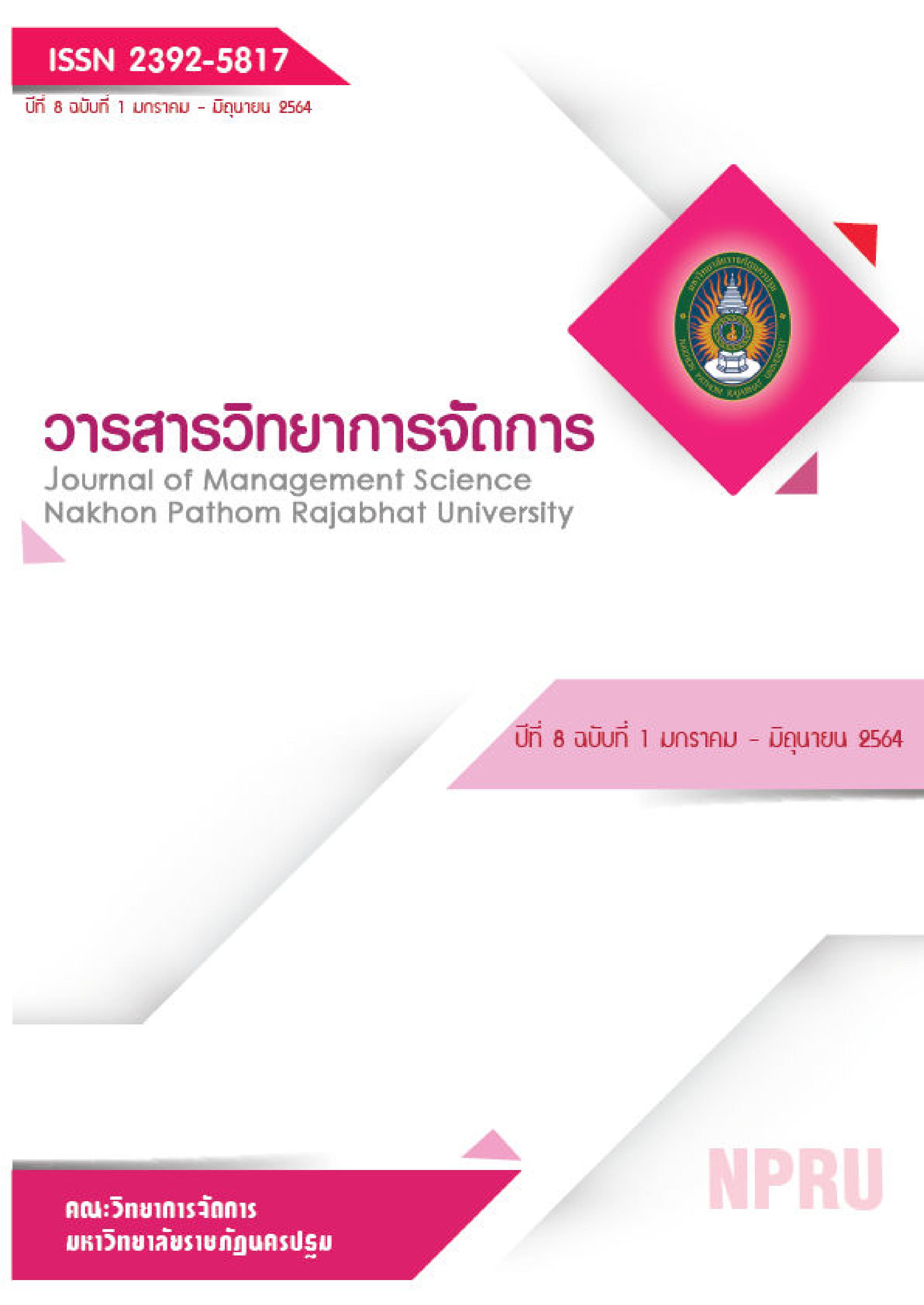The Development of the Quality of Public Administration (PMQA) in the Organization Management under the Policy of Thailand 4.0 of Agencies under the Ministry of Natural Resources and Environment in Phetchaburi Province
Main Article Content
Abstract
This research aimed to study: (1) study the level of quality development of public administration (PMQA) in organizational management. of agencies under the Ministry of Natural Resources and Environment in Phetchaburi Province. (2) Study Thailand 4.0 policy in organizational management of agencies under the Ministry of Natural Resources and Environment in Phetchaburi Province. (3) Study Thailand 4.0 policy in organizational management. There is a rational relationship with the development of quality of public administration (PMQA) in the management of the organization of agencies under the Ministry of Natural Resources and Environment in Phetchaburi Province The sample group used in the research was 130 personnel working in agencies under the Ministry of Natural Resources and Environment in Phetchaburi Province. The quota random sampling method was used. Data were treated and analyzed by using descriptive and Inferential Statistics methods, which were percentage, mean, standard deviation and Multiple Regression Analysis.
Findings:
1. The level of quality development of public administration (PMQA) in the management of the organization of agencies under the Ministry of Natural Resources and Environment in Phetchaburi Province In the overall and in each aspect there is a high level of development. The order is as follows: Measurement, Analysis and Knowledge Management. Human resource focus Organization Strategic planning Process management Assessment and in giving importance to service recipients and interested parties
2. Thailand 4.0 policy for organization management of agencies under the Ministry of Natural Resources and Environment in Phetchaburi Province In overall and in each aspect, it was practiced at a high level. In the following order In support of the Ministry of Natural Resources and Environment Technology Creative and innovation
3. Thailand 4.0 Policy for Organizational Technology Innovation Management And in support of the Ministry of Natural Resources and Environment There is a rational relationship with the development of quality of public administration (PMQA) in the organization management of agencies under the Ministry of Natural Resources and Environment in Phetchaburi Province. With statistical significance at the level of 0.001 and the Thailand 4.0 policy on organizational management Creative There is a rational relationship with the development of quality of public administration (PMQA) in the organization management of agencies under the Ministry of Natural Resources and Environment in Phetchaburi Province. Statistical significance at the level of 0.01 is the multiple regression analysis.
The equation has 92% predictive power. The multiple regression analysis equation is Ŷ = -0.271* + 0.684 x1** + 0.116 x2** + 0.101 x3** + 0.161 x4**
Article history: Received 23 March 2020
Revised 15 May 2020
Accepted 18 May 2020
SIMILARITY INDEX = 2.81 %
Article Details
The views and opinions of the article appearing in this journal are those of the author. It is not considered a view and responsibility of the editorial staff.
References
ปิยะพงษ์ ประจวบบุญ. (2553). การพัฒนาเครื่องมือวิเคราะห์สถานภาพองค์การเทศบาลตำบลชุมพลบุรี อำเภอชุมพลบุรี จังหวัดสุรินทร์. วิทยานิพนธ์ปริญญาศิลปศาสตรมหาบัณฑิต มหาวิทยาลัยมหิดล.
พรพงษ์ ปอประพันธ์. (2560). การบริหารงานกิจกรรมพัฒนาคุณภาพที่มีผลต่อองค์การสมรรถนะสูง. Journal of MCU Peace Studies, 6 (4), 1,658-1,671.
ภูวนาถ วิสุทธากร. (2558). การพัฒนาความคิดสร้างสรรค์เพื่อสร้างผลการปฏิบัติงานเชิงนวัตกรรมของบุคลากรสายสนับสนุนการสอนมหาวิทยาลัยราชภัฏกาญจนบุรี. Veridian E-Journal, Silpakorn University ฉบับภาษาไทย สาขามนุษยศาสตร์ สังคมศาสตร์ และศิลปะ, 8(1), 1,012-1,031.
รติ บุญมาก. (2551). แรงจูงใจและการสนับสนุนจากองค์การที่มีผลต่อการปฏิบัติงานการพัฒนาคุณภาพการบริหารจัดการภาครัฐ ของเจ้าหน้าที่สาธารณสุขในศูนย์สุขภาพชุมชน จังหวัดหนองบัวลำภู. วิทยานิพนธ์สาธารณสุขศาสตรมหาบัณฑิต มหาวิทยาลัยขอนแก่น.
วรรณศรี แววงาม. (2555). เกณฑ์คุณภาพการบริหารจัดการ (PMQA) วิทยาลัยการสาธารณสุขสิรินธรตามทัศนะของบุคลากร.วิทยานิพนธ์สาธารณสุขศาสตรมหาบัณฑิต มหาวิทยาลัยบูรพา.
ศิริวัฒน์ เปลี่ยนบางยาง. (2558). ประสิทธิผลของการใช้เทคโนโลยีสารสนเทศในการปฏิบัติงานของเจ้าหน้าที่องค์กรปกครองส่วนท้องถิ่น. วารสารวิชาการ Veridian E-Journal, Silpakorn University, 8(3), 1,051-1,062.
ศิวนันท์ ศิวะพิทักษ์. (2554). การจัดการนวัตกรรมขององค์กรธุรกิจที่มีผลต่อพฤติกรรมการสร้างนวัตกรรมของพนักงาน. ดุษฎีนิพนธ์บริหารธุรกิจดุษฎีบัณฑิต มหาวิทยาลัยธุรกิจบัณฑิต.
สถาบันพัฒนาครู คณาจารย์ และบุคลากรทางการศึกษา และมหาวิทยาลัย เทคโนโลยีราชมงคลธัญบุรี. (2551). ยุทธศาสตร์การพัฒนา ครู คณาจารย์ และบุคลากรทางการศึกษา พ.ศ. 2552-2555. กรุงเทพมหานคร: สถาบันพัฒนาครู คณาจารย์ และบุคลากรทางการศึกษา.
สำนักคณะกรรมการพัฒนาระบบราชการ. (2552). PMQA การพัฒนาองค์การสู่ความเป็นเลิศ. กรุงเทพมหานคร: บริษัท วิชั่น พริ้นท์ แอนด์ มีเดีย จำกัด.
สำนักงานทรัพยากรธรรมชาติและสิ่งแวดล้อมจังหวัดเพชรบุรี. (2561). ประวัติหน่วยงาน. เพชรบุรี : สำนักงานทรัพยากรธรรมชาติและสิ่งแวดล้อมจังหวัดเพชรบุรี.
Christensen, C. (1997). The innovator's dilemma. New York, USA: Phiaddephia: Sauders.
Davis, G. A. (1973). The school wide enrichment model: Developing creative and productive giftedness. In Colangelo, N., and Davis, G. A. Handbook of Gifted Education 184-203. United State of American: Pearson Education.
Layton, D. (1994). Research in education. (4th ed.). New Jersey: Prentice Hall.
Green, S. B. (1991). How Many Subjects Dose It Take to Do a Regression Analysis?. Multivariate Behavioral Research, 26(3), 499-510.


